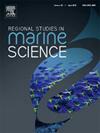Effect of CO2 driven seawater acidification on survival, growth, amino acid and fatty acid levels in the edible shrimp Litopenaeus vannamei
IF 2.1
4区 环境科学与生态学
Q3 ECOLOGY
引用次数: 0
Abstract
Acidification in the ocean environment is considered a worldwide problem that drives serious consequences for organisms. The current investigation was focused to study the effect of CO2 induced ocean acidification (OA) on the survival, growth, and composition of amino acids and fatty acids in the shrimp Litopenaeus vannamei. A seven weeks OA experiment was conducted on the shrimp groups with different pH such as 8.2 (control), 7.8, 7.6, 7.4, 7.2, and 7.0. A considerable decline in survival, growth, essential and nonessential amino acids, and saturated fatty acids was recorded in shrimps under OA exposures (pH 7.8–7.0). In this context, a notable improvement in amino acids (histidine, alanine, and cysteine) and fatty acids (palmitoleic acid, linoleic acid, linolenic acid, eicosapentaenoic acid, and docosahexaenoic acid) in L. vannamei reared under acidified seawater environments suggests that the high demand for these amino acids and fatty acids to tolerate the acidic stress.
求助全文
约1分钟内获得全文
求助全文
来源期刊

Regional Studies in Marine Science
Agricultural and Biological Sciences-Ecology, Evolution, Behavior and Systematics
CiteScore
3.90
自引率
4.80%
发文量
336
审稿时长
69 days
期刊介绍:
REGIONAL STUDIES IN MARINE SCIENCE will publish scientifically sound papers on regional aspects of maritime and marine resources in estuaries, coastal zones, continental shelf, the seas and oceans.
 求助内容:
求助内容: 应助结果提醒方式:
应助结果提醒方式:


